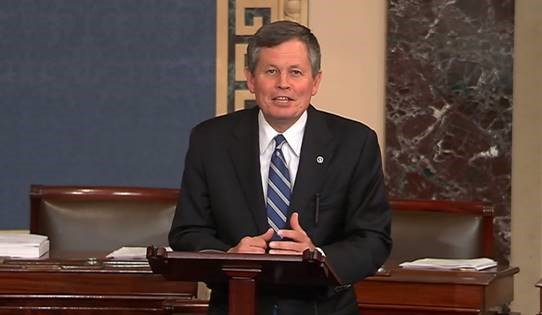Daines’ bill will increase government transparency, accountability, and strengthen security at the Capitol
U.S. SENATE — Under the leadership of U.S. Senator Steve Daines, Chairman of the U.S. Senate Appropriations Legislative Branch Subcommittee, the U.S. Senate passed the first Legislative Branch appropriations bill through regular order in nearly a decade.
The 2019 Fiscal Year Legislative Branch Appropriations Act, which was secured by Daines, includes provisions to create an E-file system for U.S. Senate candidates, investments to help meet the Capitol’s security needs, and directs the Congressional Budget Office to be transparent with its studies.
Prior to its passage, Daines spoke on the floor of the U.S. Senate to urge Senate colleagues to return to regular order and pass his bill to increase accountability, transparency and security within Congress.

Watch video HERE.
Download video HERE.
“This bill is good news for government transparency, accountability, taxpayers and security at the Capitol,” said Daines. “It is about time we do our jobs and fund the government on time.”
The Legislative Branch Subcommittee appropriates funds for all of the legislative branch. This includes the U.S. Senate, the U.S. House of Representatives, the Library of Congress, the U.S. Capitol Police, Congressional Budget Office and the Architect of the Capitol, among other entities. For a full list of the Subcommittee’s jurisdiction, click HERE.
Read the full bill text, HERE.
Highlights from Legislative Branch Appropriations Bill:
Increasing Public Transparency
The bill includes a provision, known as E-File, which increases public transparency and access to U.S. Senate campaign fillings.
This provision reduces unnecessary bureaucratic red tape, and would save taxpayer dollars by having candidates for the U.S. Senate directly file to the Federal Election Commission, instead of the current practice.
Increasing Accountability and Oversight
The bill includes reforms related to telecommunications procurements from certain countries (China, Russia, Iran, and North Korea), blocking pornography on Legislative Branch computer networks, and electronic filing by Senate candidates.
The bill directs the Congressional Budget Office to increase transparency on how it reaches conclusions on its cost analysis and scoring.
Preparing for Modern Security Threats
The bill also addresses cybersecurity threats by providing funding for the continued cybersecurity initiatives of the Sergeant at Arms for Senate networks.
The bill includes a provision prohibiting Open World from hosting senior officials of the Putin regime and limits appropriated funding for Russian participants to those engaging in free market development, humanitarian activities, and civic engagement.
###
